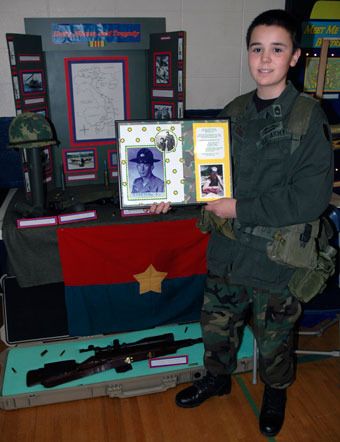ARLINGTON — For three local eighth-graders, it was a chance to learn the histories of their own families as much as their country.
This year’s Post Middle School Social Studies Fair on March 26 boasted its usual mix of projects centered around Washington state history, U.S. history from before 1900 and students’ family histories, but Thomas Stretch, Michaela Bonine and Samantha Cordner took that latter lesson to heart as all three donned attire meant to honor their families’ legacies.
Stretch and Bonine were both inspired by relatives who have served in the military, while Cordner wanted to share her Native American heritage.
Stretch examined the Vietnam conflict through the experiences of his grandfather, Kenneth Stretch, who served in the Army from 1954-1970.
“He was a platoon leader for four squadrons,” said Thomas Stretch, whose Vietnam-era Army uniform was assembled from various military surplus stories. “I knew he was in Vietnam since I was born, but as I’ve gotten older and been able to understand more, he’s told me a lot more about what happened and the sacrifices that were made.”
While Stretch’s display wasn’t short on technical details, listing the various makes and models of vehicles and weapons that were used in Vietnam, he cared more that the life stories of veterans such as his grandfather get passed on to future generations.
“As our veterans age and die, it’s up to us to keep their memories alive,” Stretch said.
Rather than focusing on a single period of U.S. military history, Bonine wound up compiling three books full of information about the dozens of members of her family who have served in various branches of the military.
“That’s seven generations, in every branch except for the Coast Guard,” said Bonine, whose Navy camouflage uniform had come from the commissary of Naval Station Everett. “It could possibly be part of my future too. My uncle Freddy was a master chief petty officer in the Navy, and he managed to make a career out of it.”
Bonine’s display was slanted heavily toward the Navy, to reflect the number of her relatives who have worn sailors’ uniforms, and even included an antique Bluejacket’s Manual. Her uncle Charles Kerns contracted cancer from serving on board USS Robert K. Huntington 10 miles out from the first atomic bomb test at Bikini Atoll in 1946. Her grandfather, Kurt Schleichert Sr., was also a sailor and raised her until his death six years ago.
“I want people to know that my family did something important on behalf of a just cause,” Bonine said. “We should support our troops, because while everyone pays for war, they make sure that the rest of us don’t take as much of a toll.”
Cordner last saw her great-grandmother when she was two, but before she died two years ago, she received countless tales of the struggles of the Cherokee peoples from her great-grandmother, secondhand through Cordner’s father
“My dad would go back to Oklahoma every year to look after my great-grandma because she was sick, and he’d come back with all these amazing stories from her,” said Cordner, whose ceremonial dress was a family heirloom from her aunt. “I would cry when I heard them.”
Cordner’s display focused on the Trail of Tears, especially on the estimated 4,000-8,000 lives that were lost out of the 15,000 Native Americans who were forced to relocate from their homelands.
“How would we feel, if the president today were to tell us what Andrew Jackson told the members of those tribes back then?” Cordner asked. “Mothers had to watch their own children die.”
“The beauty of these student projects is that they learn, writing, research and history at the same time,” said Mike Preisinger, an eighth-grade social studies teacher at Post Middle School. “It’s like a mini-senior project. I love the idea of the public reaffirming these kids’ work at these fairs.”







